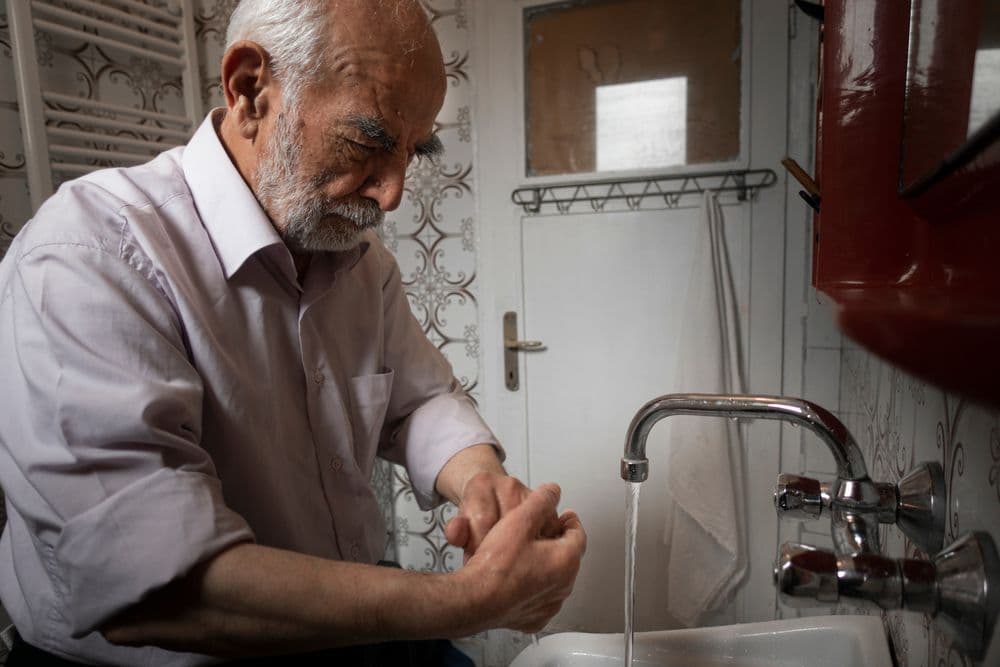The Importance of Personal Hygiene in a Care Home

Estimated Reading Time: 6 minutes
Personal hygiene is important for everyone, but it’s particularly crucial for the elderly. This is because as we age, we become more prone to catching infections and diseases, some of which can be caused by poor hygiene, bacteria and dirty environments. So, to find out why personal hygiene is important in a care home setting, read on for our useful guide.
Kickstart your care search
Find the best care homes in your area through Lottie.
Why Is Personal Hygiene Important in a Care Home?
Personal hygiene means the practice of keeping ourselves clean, from regular handwashing to bathing and showering. Not only does being clean make us feel better about ourselves and improve our overall wellbeing, but it also helps to prevent the spread of infection and disease.
As seniors aren’t as resilient when it comes to fighting infection, their immune systems are more vulnerable to catching diseases in places with poor personal hygiene, meaning that disease outbreaks can be harmful and even be fatal in serious cases.
In addition to disease and infection, poor personal hygiene can also cause or worsen existing skin complaints, especially for residents who spend a lot of time in bed.
Community Living
It’s not just the residents in a care home that need to follow good hygiene practices, but the whole care home needs to be kept clean and germ-free.
Clothing
Residents’ clothing should be washed regularly and bedding needs to be changed and washed at least once a week to keep it fresh. Bedding, towels and linen can be separated into different categories to prevent cross-contamination.
Communal Area
Housekeeping teams should check and clean communal areas, bathrooms and dining rooms as part of their day-to-day role. Regularly cleaning and disinfecting surfaces and equipment around the home keeps disease at bay, while also making the home look more attractive.
A clean environment is extremely important to prevent commonly transmitted infections spreading. Many residents may suffer from health problems and have a weak immune system so this is of paramount importance.
Any high risk areas should be cleaned with utmost importance and specialist equipment used if needed.
Bedrooms and Bathrooms
Housekeeping and cleaning staff will also clean residents’ bedrooms, including changing the sheets, hoovering, dusting, mopping and disinfecting personal items such as soft furnishings and photo frames and electrical items like DVD players and mobile phones.
Bathrooms should also be kept clean including cleaning the bath, toilet and bathroom floors.
We’re here to help you find the right care home for you or your loved one. You can request a free list of care homes from our Care Experts, who will then share homes matching your budget, location and type of care needed. You can also search for care through our easy-to-use directory.
Personal Hygiene
In residential care homes it will usually be left to the residents to use good hygiene practice. This includes cleaning themselves regularly, hand washing, washing hair and maintaining good oral health.
They can be encouraged to do this though by both staff and family members. The best option is to have a set daily routine to stick to.
In nursing homes care staff will be on hand to help with hygiene daily tasks.
Research has shown that care homes that make an effort to smell more homely make residents feel more safe and relaxed, whether that’s a scented cleaning product or an air freshener .A clean and tidy care home is a pleasant place to live for residents and will also give future care seekers and prospective residents a good first impression when they come to visit.
Resident Hygiene
When we get older, it can become more difficult to keep up with personal hygiene – this could be due to medical conditions, or simply that we aren’t as mobile as we once were. In a care home, this is where nursing staff come in, helping residents to wash and stay clean and comfortable.
Tasks that care home staff might regularly help residents with include:
- Washing face, bathing or showering
- Washing hands regularly
- Brushing teeth
- Cleaning dentures
- Washing and combing or brushing hair
- Trimming and cleaning nails
- Getting dressed
All care home staff are trained in preserving residents’ dignity in care, using techniques like following a set routine, playing music during a bath, using special scented products or talking to the person throughout the experience to reassure them, relax them and prevent any embarrassment.
Hygiene Tips for Care Home Residents
Some residents may wish to have their independence promoted and continue to look after their own personal hygiene, with minimal support from staff. To make this easier, all residents should be supplied with personal care products they may need when moving into a care home, such as soap, nail clippers, hair brushes and shampoo.
If residents find it difficult to wash their own hair, no rinse shampoo caps and hair cleaning aids can make the process easier. For residents who prefer taking baths to showers, perhaps it can be arranged that they have a bedroom with a bath in the ensuite. If available, residents can be encouraged to use the home’s hairdressing and spa facilities for some pampering.
Staff and Visitor Hygiene
In a care home setting, staff must also follow good hygiene practices, too. Staff should regularly wash their hands, especially after touching residents, or handling medication or food, to prevent the spread of germs and adhere to infection control guidance. All medical equipment needs to be properly sterilised – and supplies should ideally be bought pre-sterilised. Catering staff must wear protective clothing such as aprons, gloves and hairnets while preparing and serving food, as well as keeping kitchen surfaces, food preparation stations and dining areas clean and sanitised and storing food in the right way.
Visitor hygiene is also important to ensure that no germs are brought into the care home and visiting family members and friends should be encouraged to wash their hands regularly throughout the visit. In fact, in the wake of the COVID-19 pandemic, personal hygiene in care homes is under closer scrutiny than ever – and both staff and visitors may be asked to use hand sanitiser, wear a face mask while on the premises and practice social distancing with their loved ones, if required.
Care Quality Commission and Hygiene
The Care Quality Commission (CQC) is an independent regulator of health and adult social care in England that inspects care homes and gives them a rating. There are five key areas the CQC use to inspect care homes, which are:
- Safety
- Effectiveness
- Caring
- Responsiveness
- Well-led
Hygiene and cleanliness practices in the care home’s facilities are covered in the above areas and any concerns about hygiene or cleanliness will be flagged or raised as an issue.
Good personal hygiene is exceptionally important in a care home and helps to protect residents, keeping them healthy, safe and comfortable and feeling their best.
Lottie matches care seekers with the best care homes for their needs. You can request a free care home shortlist from our Care Experts, who will share homes matching your budget, location and type of care needed. You can also search for care through our easy-to-use directory.



